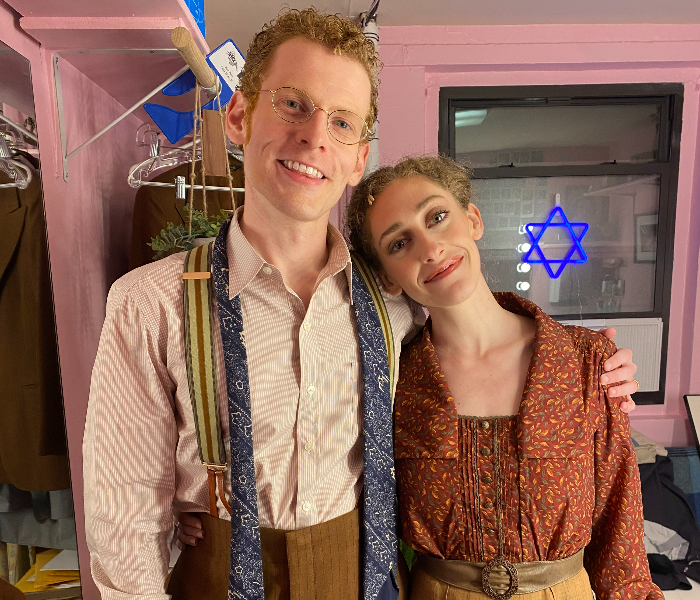Translate Page

The talented actors covering Ben Platt, Jodie Comer and other celebrities on what it takes to go on
---
During the 2021-2022 season, everyone was talking about understudies. They were the widely sung heroes of Broadway's return as the theatre industry struggled to adapt to a COVID-endemic world. Nearly two years after Broadway's grand reopening, understudies are still the folks making sure the shows go on, and they're seizing the spotlight like never before.
"It's certainly a very interesting place that we're in right now where the reality of all these swings and understudies going on is pretty real," says Max Chernin, an ensemble member in Parade who also serves as the standby for Ben Platt. "It's not just someone sitting backstage for the entire run of a show, never knowing if they're ever going to go on. They really could go on and they could go on for five days!"
Unfortunately, audience members aren't always enthusiastic about understudies, especially if they bought tickets to see a famous actor. And there are a lot of celebrities on Broadway right now: Over a third of shows running feature a notable name in a principal role.
But when performers with above-title billing can't go on due to illness, a scheduling conflict or, say, a choking smog descending on New York City, understudies must step in with unwavering confidence. "Understudying isn't a job for people who are going to feel insecure," says Dani Arlington, who understudies newly minted Tony Award winner Jodie Comer in the one-woman tour de force Prima Facie. "The most important thing for me is to just make sure that I tell the story to the best of my ability."
Judith Lightfoot Clarke, who understudied Laura Linney in Summer, 1976, which recently wrapped up its run at Manhattan Theatre Club, agrees about the need for mental fortitude. "None of us want to let down an audience member," she says. "You have to have a little more resilience because there's going to be that sometimes palpable feeling from the audience of: but I wanted to see" the star.
Clarke has plenty of experience covering well-known actors, including Mary-Louise Parker, Joanna Gleason and Mare Winningham. That's given her a sense of perspective and prompted her to focus on what she can bring to a part, not others' expectations.
"You're covering the character, not the famous person," she says. It's a sentiment echoed by her fellow Summer, 1976 understudy, Finnerty Steeves, who covered Jessica Hecht for the second time on Broadway. "For me to sit there and do a Jessica Hecht imitation would be horrendous," Steeves says. "You can't copy her. So, you have to find a way to be inspired and use the choices that she's made and then fill it with your own heart."
All the understudies interviewed say they adhere to two main rules: Never impersonate the actor you're covering, and always find ways to make the role your own. Steeves and Clarke were thankful to be able to rehearse with their potential scene partners, Linney and Hecht respectively. The stars actually requested it. "We get to see them do it a few times a week," Steeves says. "It's in their best interest to have done it once with us." For their mock performance, Linney told Steeves to invite guests. "It was so sweet of her. I just thought that was incredible and very generous," she says, especially since she ultimately never got to go on.
While understudies must be ready at the drop of a hat, sometimes they know when they'll perform in advance. Chernin made his debut as Leo Frank in Parade during a planned absence for Ben Platt. Micaela Diamond, who plays Frank's wife Lucille, offered to practice with Chernin. "I really felt like I was able to play and do some of my own things, and a lot of that was due to the fact that Micaela wanted to rehearse," he says. "That was just such a lovely thing to experience as an actor."
Chernin also had the advantage of a friendly house. "Everyone I've ever known came out of the woodwork to see me!" he says with a laugh. In fact, he confesses that perhaps the audience was a little too friendly. With raucous entrance applause, he was left to fiddle awkwardly with his tie while Diamond grinned, letting him soak it all in… and sweat a little. "I was like, are we ever going to start the scene?" he recalls, chuckling.
congratulations dani on your broadway debut performance! 👏🏼
— queenie (@jodiemcoma) May 26, 2023
🎥: valsolangeques pic.twitter.com/YwMziSh3tU
Since Prima Facie is a solo show, Arlington doesn't have scene partners to rehearse with, but she does have plenty of marks to hit and dialogue to properly time in a highly technical production. To give her the opportunity to perform in front of a packed house, producers set up a special free performance on May 26 for her to headline. "It's not normal for an understudy to have a sold-out show on Broadway!" she acknowledges. "It was brilliant. I had a super-supportive, amazing audience."
Whether covering for a boldface name or not, an understudy's job is to know the role inside and out and to be ready to go on at a moment's notice—even in the face of disappointed patrons. Clarke compares seeing an understudy to receiving a gift that wasn't what you asked for. "It could be something amazing that you didn't know you wanted," she says.
Arlington hopes experiences like hers will inspire other productions to put a spotlight on their understudies, even if just for one night. "I hope that a lot of producers take note and find ways to celebrate their understudies."
---
Top image: Ben Platt's understudy Max Chernin and his costar Micaela Diamond backstage at Parade on Broadway. Photo courtesy of Max Chernin.
TDF MEMBERS: Log in to your account to browse all our theatre and dance offers.